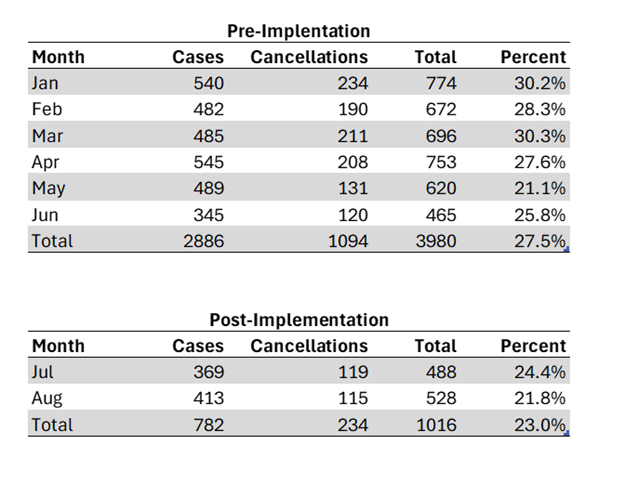Monday Poster Session
Category: Colorectal Cancer Prevention
P2658 - Improving Operational Efficiency Through the Implementation of a Novel Service Platform for Colonoscopy Prep
Monday, October 27, 2025
10:30 AM - 4:00 PM PDT
Location: Exhibit Hall

Daniel L. Halberg, PhD
Braintree Laboratories, Inc.
Cave Springs, AR
Presenting Author(s)
James Higham-Kessler, MD, MSCI1, Andrew S. Korson, MD1, Jessica Funk, RN2, Lisa Harpel, PharmD3, Daniel L. Halberg, PhD4
1Rocky Mountain Gastroenterology, Lakewood, CO; 2North Denver Endoscopy Center, Thornton, CO; 3Braintree Laboratories, Inc., North Easton, MA; 4Braintree Laboratories, Inc., Cave Springs, AR
Introduction: Lack of high-quality colonoscopy preparation, “no-show” and same day cancellations are all major problems in GI practices. The literature demonstrates that the greatest deterrent to colonoscopy is patients’ avoidance of the bowel prep. Additionally, inadequate bowel prep has been linked to reduced adenoma detection rates, increased interval cancer rates, poor patient experience, and decreased office productivity. In 2024, the ASGE/ACG Task Force on Quality in Endoscopy raised the bowel preparation adequacy threshold from 85% to 90% and upgraded the recommendation strength from level 3 to 1C. This metric now applies to both the unit and the endoscopist.
Rocky Mountain Gastroenterology (RMG) is the largest GI practice in the Rocky Mountain region operating 15 offices, six Endoscopy Centers and a specialized pathology lab. Here we present the outcome of a significant quality improvement project at RMG aimed at improving both the patient experience and operational efficiency related to colonoscopy by implementing NavGI 360™. NavGI 360 is a built-for-purpose pharmacy platform that enhances access to bowel preps and improves both patient navigation and practice efficiency.
Methods: To assess the effectiveness of NavGI 360, we selected one of our clinics (RMG Thornton) as a pilot site and performed a 60-day evaluation project. The key outcome variable was the percentage of patients who did not complete colonoscopy due to patient related factors. Three assessments were aggregated and assessed (1) procedure cancelled due to poor prep; (2) patient “no-shows”; and (3) last-minute cancellations. A 6-month “pre-implementation baseline” was established using data from Jan-Jun 2024. NavGI 360 implementation was then assessed for the subsequent two months, July and August 2024. These results were then compared to the baseline to evaluate improvements in operational metrics.
Results: Overall, n=4996 scheduled cases were assessed. During the pre-implementation baseline phase, 27.5% (n=1094) of all scheduled colonoscopies were cancelled due to poor prep, patient no-shows, and/or last-minute cancellations. During the post-implementation period, this figure improved to 24.4% (n=119/488) by Day 30, and 21.8% (n=115/528) by Day 60.
Discussion: This data suggests NavGI 360, contributed to a relative 20.7% improvement in operational efficiency by reducing patient cancellations, no-shows, and inadequate bowel preparations. This translates into a significant gain in productivity for the Thornton clinic.

Figure: Table 1: Cases vs Cancellations - Pre-Implementation vs. Post-Implementation
Disclosures:
James Higham-Kessler indicated no relevant financial relationships.
Andrew Korson indicated no relevant financial relationships.
Jessica Funk indicated no relevant financial relationships.
Lisa Harpel indicated no relevant financial relationships.
Daniel Halberg: Braintree Laboratories, Inc. – Employee.
James Higham-Kessler, MD, MSCI1, Andrew S. Korson, MD1, Jessica Funk, RN2, Lisa Harpel, PharmD3, Daniel L. Halberg, PhD4. P2658 - Improving Operational Efficiency Through the Implementation of a Novel Service Platform for Colonoscopy Prep, ACG 2025 Annual Scientific Meeting Abstracts. Phoenix, AZ: American College of Gastroenterology.
1Rocky Mountain Gastroenterology, Lakewood, CO; 2North Denver Endoscopy Center, Thornton, CO; 3Braintree Laboratories, Inc., North Easton, MA; 4Braintree Laboratories, Inc., Cave Springs, AR
Introduction: Lack of high-quality colonoscopy preparation, “no-show” and same day cancellations are all major problems in GI practices. The literature demonstrates that the greatest deterrent to colonoscopy is patients’ avoidance of the bowel prep. Additionally, inadequate bowel prep has been linked to reduced adenoma detection rates, increased interval cancer rates, poor patient experience, and decreased office productivity. In 2024, the ASGE/ACG Task Force on Quality in Endoscopy raised the bowel preparation adequacy threshold from 85% to 90% and upgraded the recommendation strength from level 3 to 1C. This metric now applies to both the unit and the endoscopist.
Rocky Mountain Gastroenterology (RMG) is the largest GI practice in the Rocky Mountain region operating 15 offices, six Endoscopy Centers and a specialized pathology lab. Here we present the outcome of a significant quality improvement project at RMG aimed at improving both the patient experience and operational efficiency related to colonoscopy by implementing NavGI 360™. NavGI 360 is a built-for-purpose pharmacy platform that enhances access to bowel preps and improves both patient navigation and practice efficiency.
Methods: To assess the effectiveness of NavGI 360, we selected one of our clinics (RMG Thornton) as a pilot site and performed a 60-day evaluation project. The key outcome variable was the percentage of patients who did not complete colonoscopy due to patient related factors. Three assessments were aggregated and assessed (1) procedure cancelled due to poor prep; (2) patient “no-shows”; and (3) last-minute cancellations. A 6-month “pre-implementation baseline” was established using data from Jan-Jun 2024. NavGI 360 implementation was then assessed for the subsequent two months, July and August 2024. These results were then compared to the baseline to evaluate improvements in operational metrics.
Results: Overall, n=4996 scheduled cases were assessed. During the pre-implementation baseline phase, 27.5% (n=1094) of all scheduled colonoscopies were cancelled due to poor prep, patient no-shows, and/or last-minute cancellations. During the post-implementation period, this figure improved to 24.4% (n=119/488) by Day 30, and 21.8% (n=115/528) by Day 60.
Discussion: This data suggests NavGI 360, contributed to a relative 20.7% improvement in operational efficiency by reducing patient cancellations, no-shows, and inadequate bowel preparations. This translates into a significant gain in productivity for the Thornton clinic.

Figure: Table 1: Cases vs Cancellations - Pre-Implementation vs. Post-Implementation
Disclosures:
James Higham-Kessler indicated no relevant financial relationships.
Andrew Korson indicated no relevant financial relationships.
Jessica Funk indicated no relevant financial relationships.
Lisa Harpel indicated no relevant financial relationships.
Daniel Halberg: Braintree Laboratories, Inc. – Employee.
James Higham-Kessler, MD, MSCI1, Andrew S. Korson, MD1, Jessica Funk, RN2, Lisa Harpel, PharmD3, Daniel L. Halberg, PhD4. P2658 - Improving Operational Efficiency Through the Implementation of a Novel Service Platform for Colonoscopy Prep, ACG 2025 Annual Scientific Meeting Abstracts. Phoenix, AZ: American College of Gastroenterology.
